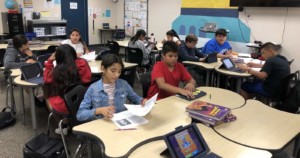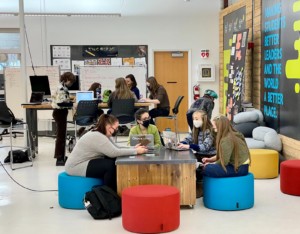5 Emerging Trends in 21st-Century Education

Editor’s Update 2022: For a great podcast on 21st-Century Education, check out this episode of the Getting Smart Podcast.
By Scott Freiberger
With the advent of new technologies being infused in school curricula, educators and school leaders are beginning to rethink all facets of data in the classroom. New, innovative methods of data collection are continually being developed, which offer new options for ongoing formative, culminating summative and alternative assessments. Yet what precisely do nouveau “research-based instructional strategies” entail? Although challenges in curriculum design may arise due to advanced technology integration, schools are nonetheless embracing the future. Here are five emerging trends for 21st-century classrooms.
1) App Innovation and Gamification
As a result of the recent explosion in education-related apps, educators can decipher students’ interests, academic passions and “trouble spots” more readily and in real-time to differentiate and fine-tune instruction. MIT App Inventor, for example, enables students to create their own apps in the comfort of their classrooms. The app offers training for students, a forum and additional support for educators, and a “challenge” for students to create their own apps. At the same time, education-related games that enhance skills in English language arts and other subjects have exploded in popularity, such as “Mathalicious” and “Get the Math,” which provide practical, true-to-life experiences. As students become comfortable utilizing online games to learn, educators can entice students via new apps to fine-tune skill-specific areas, such as mathematics and science.
2) Digital Literacy
Creating a digital literacy curriculum can be based on students’ developmental stages, and educators should be cognizant of both the risks (such as distractions) and myriad learning opportunities that technology integration and utilization in the classroom may provide. With increasing numbers of teachers using technology in the classroom and schools permitting students to become engaged with content via digital literacy, some schools are adopting formal digital literacy curriculum and digital literacy plans. Perhaps as a result, Google has published a plethora of resources about understanding digital literacy and digital citizenship, including YouTube videos, teacher’s guides and lesson plans.
Digital literacy may encompass simple student tasks, such as creating classroom presentations, or more intricate, collaborative work, such as video clip creations or posting online “mind-maps” using digital tools. The field of digital literacy will continue to grow in importance in the coming years as new approaches to learning via new technologies are embraced.
3) Library Media Specialists
Across the United States, and indeed throughout the world, libraries are increasingly becoming local technology hubs. Since libraries offer myriad services which require some knowledge of technology and how to access the internet, librarians’ job descriptions and key responsibilities have drastically changed.
Library Media Specialists today remain informed about new technologies and research methods, and how students (and the general public) integrate digital formats into their work. In a separate, newfound administrative role, Library Media Specialists have many new responsibilities. They not only must establish technology policies and become responsible for budget oversight, but they must also plan the physical and virtual library space, and create a welcoming, positive and innovative atmosphere. Considering how new digital formats should be arranged in new workstations and deciding which specific formats to choose could affect physical layout, budget planning and alignment and common space issues.
They also evaluate and produce information through the active use of a broad range of tools, resources and information technologies, and (particularly at the high school and collegiate levels) may also integrate technology into the curriculum, which requires a keen understanding of how new technologies enhance the learning process for students while adhering to rigorous state standards. Library Media Specialists will continue to grow in importance as technology is integrated into 21st-century school curriculum.
4) Self-Directed Professional Development
In recent years, we have seen an increase in self-directed professional development (PD) for educators that includes interactive online webinars, or videos and other content that may be streamed through web browsers. One recently-published article offers a tempting feast of online options for educators to choose from. Since states are increasingly demanding that certified educators update their skills to remain in compliance with ethical and legal guidelines and become familiar with the latest standards, some school districts are turning to self-directed, online modules to provide educators opportunities to complete interactive learning components to remain abreast of the latest developments in education.
5) Collaborative Learning
New applications are making it easier for classroom teachers to be both innovative and interactive, and this trend is expected to grow exponentially in the coming years. From Google Docs to interactive whiteboards to new applications that create quizzes and activities, this is an exciting time for collaborative learning in education.
Kahoot is one new application worth highlighting. At no cost for educators to download and install, educators may conceive of fun quizzes and learning activities to enhance student engagement. According to one review, this management system enables educators more flexibility in managing students’ learning and documenting progress from any device.
“Educreations Interactive Whiteboard” by Edmodo is another way for both educators and students alike to assess, jointly present, or partake in interactive activities. Unlike “Kahoot,” however, which is available gratis, the “Educreations Interactive Whiteboard” is available for individual classroom purchase from Edmodo for $11.99/month.
New technologies have been a boon for school leaders and educators seeking to collaborate and hone their skills. Advancements in technology should continue to enhance collaborative learning, along with improving dynamic group presentations, in 21st-century school settings.
For more emerging trends in education, see:
- Top Higher Education Learning Trends to look for in 2017
- 5 Emerging Trends in Project-Based Learning
- Three Connectivity Trends to Watch in 2017
Scott Freiberger has been an educator, school-wide instructional mentor and teacher trainer, and is completing his third master’s degree, this one in School Leadership.
Stay in-the-know with all things EdTech and innovations in learning by signing up to receive the weekly Smart Update.






sunny
21st century belongs to IT and Computer.
http://www.apsense.com/article/buy-designer-handbag-for-party-season-online-in-india.html
Replies
aime bulagnir
Comment:
it is true that we are know in a changing world.everything is changing also education in the 21st century with the use of modern innovation.
Harshali Patel
Absolutely, if Techworld is going to adopt advanced tools and technologies so will the other sectors to ease their work, and gain effective and efficient results. For that matter, Education can also adopt and implement various of the tech advancements tools for its better working.
comprobar aqui
I do this once a day when wifi is available.
Swift Elle
Definitely, Techworld can be very helpful to different industries as it will speed up work, no-hassle, stress-free.
Brock Johnson
Schools that wish to meet the requirements of industry must have digital literacy built into their curriculum. Apps, gamification and digital literacy are a good start; however new trends and advanced technologies such as AI will come along and radically alter 21st century education.
Anna H. Smith
In the 21st century, everything has been technologized which has created a large impact. The information you have shared in this article is very helpful. A new trend in academic will create a very positive impact on everyone seeking knowledge. Thanks for sharing.